Latest News
2023.11.14
Lee Women’s Hospital Utilizes AI in IVF technology to Give Birth Over 7,000 Test-Tube Babies
Lee Women’s Hospital (LWH) has pioneered the use of AI in artificial reproductive medicine, resulting in the birth of over 7,000 AI test-tube babies. Dr. Maw-Sheng Lee, the head of the hospital, stated that AI has already been introduced into clinical medicine for cancer diagnosis. With the growing issue of a declining birth rate in recent years, there has been a rising interest in using artificial intelligence in reproductive medicine treatment.
In 2017, Dr. Lee began to establish the hardware and software for the AI reproductive technology at Lee Women’s Hospital’s IVF laboratory. The Time-Lapse Embryo Monitoring Culture System, efficient servers, and an AI-driven algorithm platform were all part of this. This marked the first time AI was used in the treatment of infertile women in Taiwan, resulting in the hospital’s high average pregnancy rate through IVF surpassing 70%, far exceeding the national average pregnancy rate of 30-40%. Between 2018 and 2023, Lee Women’s Hospital’s AI Reproductive Technology has brought a total of 7,166 test-tube babies.
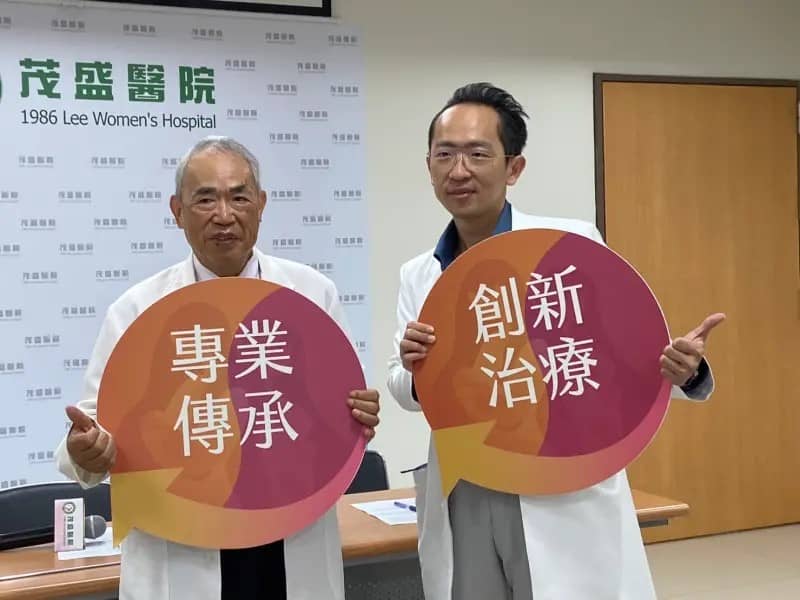
▲Dr. Maw-Sheng Lee, the hospital's head, and Dr. Chun-I Lee, the hospital's CEO.
She returned in early 2019 to have a second child. Because she still had 9 embryos, the second implantation used two of them, each with a score of 5+13=18 and 6+12=18. One of these embryos was implanted and developed successfully, resulting in the birth of a baby boy weighing 2,970 grams. Ms. Wang was 36 years old at the time. Ms. Wang expressed her gratitude to Dr. Lee!
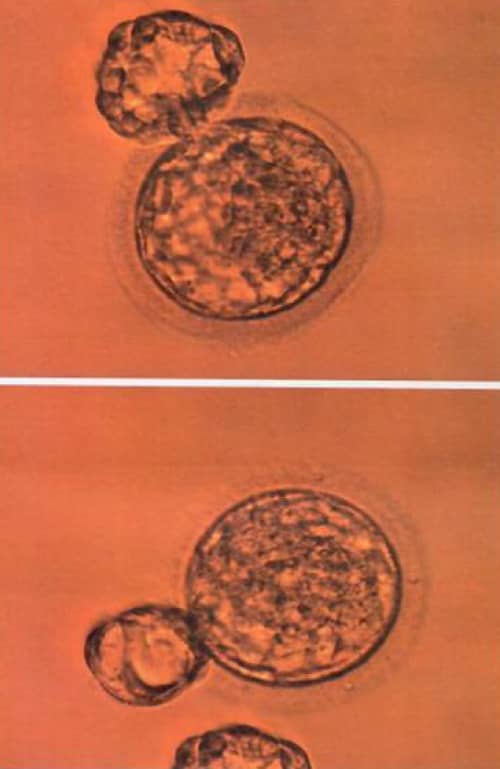
▲Embryos viewed through a microscope.
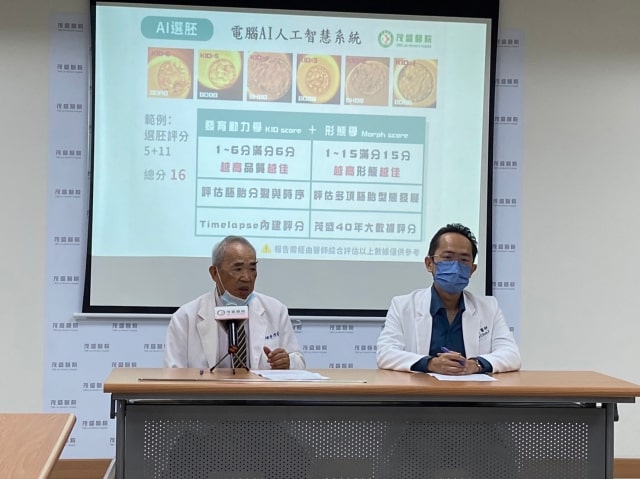
▲AI embryo grading
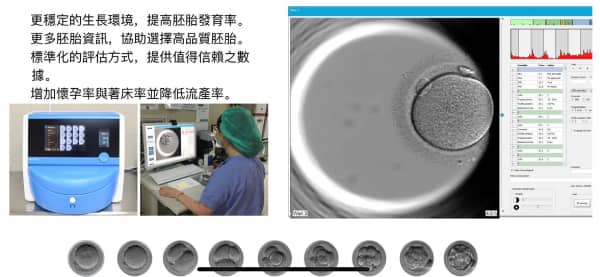
▲Time-Lapse Embryo Monitoring Culture System
Ms. Luo endured challenges during the egg retrieval process, but her strong determination to have a child helped her overcome these difficulties. She viewed the challenges as a necessary part of the journey and was grateful to Lee Women’s Hospital for making her dreams come true. Dr. Lee mentioned that witnessing the joy on his patients' faces was the vert reason he initially decided to invest significantly in developing the “Artificial Intelligence Reproductive Technology”.
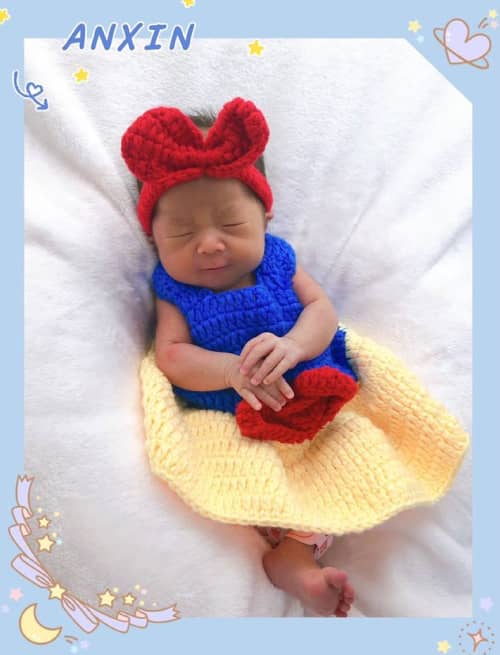
▲Case study: AI technology helped a 43-year-old woman conceive successfully
The extensive embryo images are stored on HPE and Dell EMC servers equipped with Intel Xeon processors and Nvidia graphics chips. These servers can perform high-efficiency calculations continuously and reliably 24/7. We select the highest-scoring embryos for implantation using the LWH self-developed AI-driven algorithm platform software programs, resulting in a higher pregnancy rate and lower miscarriage rates.
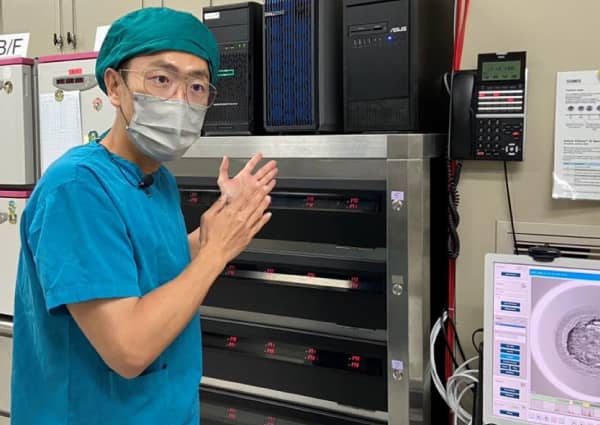
▲Dr. Chun-I Lee, CEO of Lee Women's Hospital, stated that the hospital has been continuously acquiring AI-related equipment since 2016.
In 2021, Lee Women’s Hospital published another journal article on Deep Learning of AI systems. This system can predict the quality of embryo chromosomes using extensive computer data analysis. In the same year, another paper utilized the Time-Lapse Embryo Monitoring Culture System to identify embryo characteristics and determined that embryos with better characteristics had a higher probability of developing into euploid blastocysts using an AI-driven algorithm platform.
In May of 2023, the latest research was published in the journal Scientific Reports, confirming that day 5 blastocysts are of higher quality than day 6 blastocysts, resulting in a higher live birth rate after implantation. This practice has been ongoing at the hospital for years and demonstrates once again the outstanding achievements of AI applications in artificial reproductive medicine.
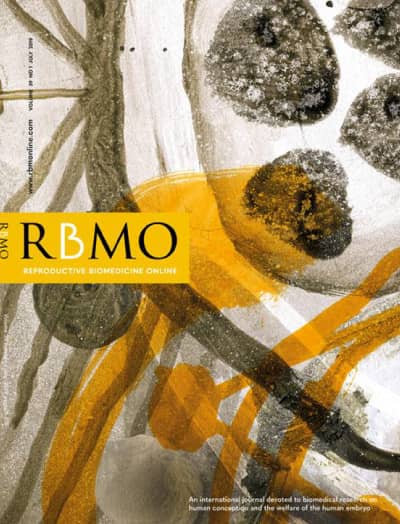
Over a span of six years, we have successfully delivered 7,166 AI test tube babies, benefiting numerous infertile couples. Dr. Maw-Sheng Lee, the head of the hospital, emphasizes, "Infertile couples from 36 countries around the world see Lee Women's Hospital's 'Artificial Intelligence Reproductive Technology.' Even top experts from various countries have approached us for advice. This demonstrates our hospital's outstanding achievements in the application of AI to artificial reproductive technology, as well as our commitment to combating Taiwan's declining birthrate.
In 2017, Dr. Lee began to establish the hardware and software for the AI reproductive technology at Lee Women’s Hospital’s IVF laboratory. The Time-Lapse Embryo Monitoring Culture System, efficient servers, and an AI-driven algorithm platform were all part of this. This marked the first time AI was used in the treatment of infertile women in Taiwan, resulting in the hospital’s high average pregnancy rate through IVF surpassing 70%, far exceeding the national average pregnancy rate of 30-40%. Between 2018 and 2023, Lee Women’s Hospital’s AI Reproductive Technology has brought a total of 7,166 test-tube babies.

▲Dr. Maw-Sheng Lee, the hospital's head, and Dr. Chun-I Lee, the hospital's CEO.
LWH first case of AI test-tube baby was born in 2018
Ms. Wang, who had previously experienced failed IVF treatments at the previous hospital, sought help from Dr. Lee at the end of 2017. Ms. Wang was fortunate enough to obtain 40 eggs during her first egg retrieval procedure; however, only 10 embryos were successfully cultivated. In early 2018, LWH utilized our newly established “Artificial Intelligence Reproductive Technology” to implant a day 5 blastocyst with a score of 2+10=12. By the end of the year, Ms. Wang had given birth to a baby boy weighing 3,414 grams.She returned in early 2019 to have a second child. Because she still had 9 embryos, the second implantation used two of them, each with a score of 5+13=18 and 6+12=18. One of these embryos was implanted and developed successfully, resulting in the birth of a baby boy weighing 2,970 grams. Ms. Wang was 36 years old at the time. Ms. Wang expressed her gratitude to Dr. Lee!

▲Embryos viewed through a microscope.

▲AI embryo grading

▲Time-Lapse Embryo Monitoring Culture System
Case study: AI technology helped a 43-year-old woman conceive successfully
Ms. Luo, who had four failed IVF attempts at a previous hospital, began IVF treatment at LWH in 2020, at the age of 43. Dr. Lee assisted her in obtaining three healthy embryos. One of the embryos with a score of 6+10=16, a high-quality blastocyst, was implanted successfully. She gave birth to a baby girl the following year, weighing 2,660 grams.Ms. Luo endured challenges during the egg retrieval process, but her strong determination to have a child helped her overcome these difficulties. She viewed the challenges as a necessary part of the journey and was grateful to Lee Women’s Hospital for making her dreams come true. Dr. Lee mentioned that witnessing the joy on his patients' faces was the vert reason he initially decided to invest significantly in developing the “Artificial Intelligence Reproductive Technology”.

▲Case study: AI technology helped a 43-year-old woman conceive successfully
Creating Asia's First “Artificial Intelligence Reproductive Technology” with the Most Advanced Laboratory in Taiwan
In general, embryos are taken out of incubators and observed under a microscope, which is a 2D observation method that cannot maintain the optimal temperature and humidity environment. Recognizing these constraints, Dr. Chun-I Lee, CEO of Lee Women's Hospital, stated that the hospital has been continuously acquiring AI-related equipment since 2016. This equipment includes Time-Lapse Embryo Monitoring Culture System, three high-efficiency servers, and software programs for an AI-driven algorithm platform. Each Time-Lapse incubator costs more than 10 million NTD and is run by senior embryologists with master’s or doctoral degrees, enabling 3D stereoscopic observation of embryos. Each Time-Lapse incubator has the capacity to store embryos for 15 patients, with each patient able to store 16 embryos for extended observation and recording.The extensive embryo images are stored on HPE and Dell EMC servers equipped with Intel Xeon processors and Nvidia graphics chips. These servers can perform high-efficiency calculations continuously and reliably 24/7. We select the highest-scoring embryos for implantation using the LWH self-developed AI-driven algorithm platform software programs, resulting in a higher pregnancy rate and lower miscarriage rates.

▲Dr. Chun-I Lee, CEO of Lee Women's Hospital, stated that the hospital has been continuously acquiring AI-related equipment since 2016.
Publishing journal articles on the application of AI in artificial reproductive
Lee Women’s Hospital continues to conduct AI research and has published four journal articles in prestigious journals. In 2019, Dr. Chun-I Lee's article was published in the journal Reproductive BioMedicine Online. This was the first article in the world to validate "Artificial Intelligence Reproductive Technology," which has resulted in an average pregnancy rate of more than 70%.In 2021, Lee Women’s Hospital published another journal article on Deep Learning of AI systems. This system can predict the quality of embryo chromosomes using extensive computer data analysis. In the same year, another paper utilized the Time-Lapse Embryo Monitoring Culture System to identify embryo characteristics and determined that embryos with better characteristics had a higher probability of developing into euploid blastocysts using an AI-driven algorithm platform.
In May of 2023, the latest research was published in the journal Scientific Reports, confirming that day 5 blastocysts are of higher quality than day 6 blastocysts, resulting in a higher live birth rate after implantation. This practice has been ongoing at the hospital for years and demonstrates once again the outstanding achievements of AI applications in artificial reproductive medicine.

LWH’s AI Babies are Spread Across 36 counties and regions
In addition to achieving high clinical pregnancy rates, Lee Women's Hospital's research outcomes stand at the forefront in Taiwan, comparable to advanced European and American nations. The hospital has spared no expense on equipment, personnel, and reinvesting research findings into clinical healthcare.Over a span of six years, we have successfully delivered 7,166 AI test tube babies, benefiting numerous infertile couples. Dr. Maw-Sheng Lee, the head of the hospital, emphasizes, "Infertile couples from 36 countries around the world see Lee Women's Hospital's 'Artificial Intelligence Reproductive Technology.' Even top experts from various countries have approached us for advice. This demonstrates our hospital's outstanding achievements in the application of AI to artificial reproductive technology, as well as our commitment to combating Taiwan's declining birthrate.
Reference
- Lee, C. I., Chen, C. H., Huang, C. C., Cheng, E. H., Chen, H. H., Ho, S. T., Lin, P. Y., Lee, M. S., & Lee, T. H. (2019). Embryo morphokinetics is potentially associated with clinical outcomes of single-embryo transfers in preimplantation genetic testing for aneuploidy cycles. Reproductive biomedicine online, 39(4), 569–579. https://doi.org/10.1016/j.rbmo.2019.05.020
- Lee, C. I., Su, Y. R., Chen, C. H., Chang, T. A., Kuo, E. E., Zheng, W. L., Hsieh, W. T., Huang, C. C., Lee, M. S., & Liu, M. (2021). End-to-end deep learning for recognition of ploidy status using time-lapse videos. Journal of assisted reproduction and genetics, 38(7), 1655–1663. https://doi.org/10.1007/s10815-021-02228-8
- Chen, C. H., Lee, C. I., Huang, C. C., Chen, H. H., Ho, S. T., Cheng, E. H., ... & Lee, M. S. (2021). Blastocyst morphology based on uniform time-point Assessments is correlated with mosaic levels in embryos. Frontiers in Genetics, 12, 783826. https://doi.org/10.3389/fgene.2021.783826
- Chen, CH., Lee, CI., Huang, CC. et al. Increased incidence of live births in implanted day 5 versus day 6 blastocysts following single embryo transfers with PGT-A. Sci Rep 13, 12725 (2023). https://doi.org/10.1038/s41598-023-40052-5




